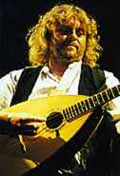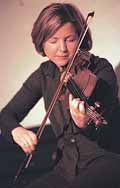 |
||
The Living Tradition
|
|
|||
| LÚNASA -TWIST OF FATE |
|
|||
|
{graphic} |
||||
|
Sometimes
the best laid plans of mice and men don't work as well as pure serendipity.
Many have set out to intentionally form a band by assembling the
best musicians they can, but often it doesn't last long.
A band becomes a band by the sum of all the parts, regardless of
how outstanding the individual parts are.
Therefore, often, when a bunch of great players are thrown together,
the strengths of the individuals can work against the sound of "the
band". Throw in the dynamics of differing personalities, "stage presence"
and other factors, and many tend to crumble rather rapidly. While it may work for the short term, surviving
the long haul is another matter. Good
bands are often a flash in the pan. Great bands evolve. When fiddle player Sean Smyth hooked up with bassist Trevor Hutchinson and guitar player Donogh Hennessey, it was serendipity at work. Sean was practicing medicine and looking for an outlet for his playing that was different than what he'd done before. Trevor and Donogh had been playing together in the Sharon Shannon band. The three got on so well that Sean began to incorporate a vision he had for the sound of a band - which was to include both flute and uilleann pipes along with fiddle, bass and guitar. Sean had long appreciated the sound of the Bothy Band, but wanted to take it further and a bit edgier and without a vocalist. Enter uilleann piper John McSherry and multi-instrumentalist Mike McGoldrick. Lúnasa was beginning its evolution. To rave reviews. A Scandinavian tour and - almost before they knew it - a live album, the self-titled "Lúnasa". When this sort of "pre-Lúnasa" group were asked to do a tour of Australia, Mike McGoldrick couldn't do it so Sean Smyth called up flute player Kevin Crawford. Kevin relates, "I actually turned down that tour. I was just after getting married and taken on a full time job with Clare FM radio in marketing and sales, and I was kinda happy doin' the settled husband bit, you know?" "It was really the clothes", whispered Sean. Kevin laughs, "I was delighted with myself going out every morning with the suit and the tie and walking the street. I was happy in this role, you know? And the next thing I know the phone rang with "would you like to go to Australia?" The idea of touring with Sean and the two boys was a real treat, but I said no, I'm just married, in the job, blah, blah, blah. So I got off the phone and my wife, Tracy said, "What was that all about?" "Sean Smyth wants me to go off to Australia on tour with them". Tracy says, "You have to go". And I'm thinking, does she want to get rid of me already? (Laughing) "You'll regret it the rest of your life", she said, "if you don't go". A lot of things fell into place then to make it happen for me and I have to believe it was meant to be". “That was actually the birth of the band as "Lúnasa", says Smyth. "We didn't even have a name at that stage, but we performed at the Blue Mountain Festival outside of Sydney - the four of us - Trevor, Kevin, Donogh and myself. That was the start of it." While Lúnasa's sound is undeniably their own, the inevitable comparisons begin to emerge, and the most common comparison has been to the Bothy Band. There are certainly worse things than being compared to the Bothy Band, but it makes Lúnasa a bit uncomfortable. Was it because it wasn't an apt comparison or because they didn't want to be compared to another band? Kevin Crawford responded, "If there were any comparison to be made in a positive sense, you couldn't ask for a better comparison than to be up next to the Bothy Band. But me, personally, I don't think we really..." "... deserve it", finishes Smyth. Crawford goes on, "I always find it hard to take on because the Bothy Band to me - that's the benchmark. If you can get your music to even a quarter of that level, you're doing very well, musically, like. I never really believed that whole theory until P.J. Curtis mentioned it to me when I gave him the album. P.J. was the tour manager for the Bothy Band and toured with them from the very early stages right up towards the end. He knew what they were thinking and what the process was behind the band. P.J. called up and said, "All I can say is if the Bothy Band were still around today, this is what they would sound like - you have taken what the Bothy Band finished with in 1979 and you've brought it up to 1999 in exactly the way the Bothy Band would've visualized it." “P.J. was particularly going on about the use of the three whistles and the use of harmony", continues Crawford. "And the major rhythm of Donogh and the base line of Trevor being relevant to Triona's (NiDomhnaill) clavicord. In that sense, it validated the Bothy Band connection all right, but its just for me - I find it really hard to carry that, 'cause I look at it on an individual basis. If we're supposed to be like the Bothy Band, then obviously the flute player is supposed to be like Matt Molloy. I have an awful lot to do before I'm on a level anywhere near what Matt Molloy's done, you know?" Regardless of comparisons, Lúnasa have their mind set on what they want to do with the tunes and more importantly what they don't want to do, explains Kevin. "There's no point in doing tunes just because we know them and are comfortable with them. Unless there's the whole sound of fiddle, pipes, flute, guitar and bass... unless we can collectively give that tune or set of tunes a new life, we won't do them. Donogh Hennessey adds, "We know what we want - somewhere in the middle ground where everyone's happy and we know ourselves. We're all a piece of the band, but no individual is more important than the whole band." "We all have something very different to add to the mix", says Kevin, "When everybody does have their say in the collective process, you do come up with a recipe for something that's quite different. Trevor has very good ideas and his vision of Irish music is very different to my vision and Sean's and Donogh's is very different as well. Myself and Sean and Cillian would have a huge well of traditional tunes we could draw on at any time and they're beautiful tunes, but a lot of them would've been previously recorded. However, Donogh and Trevor often say there's no point in doing them unless we can do better than they've previously been done. "I would've come from traditional solo playing, says Smyth, but I always wanted to play in a band - but doing Irish dance music - reels and jigs and stuff. Going from that individual setting that we grew up in as kids - with an individual mind set - to playing in a band setting with a group mind set - its a big learning process". Double bass player Trevor Hutchinson has a great deal of experience in the group mind set, having played in several bands, and the other members of Lúnasa appreciate his ability to read how the band is performing as a band. Furthermore, Hutchinson has recorded and produced albums for other musicians at his own studio, where, in fact, many of the tracks for Lúnasa's latest release were laid down. Musically, creating a certain tension and developing the setting of the tunes is one of Trevor 's specialties, according to the other members of the band. Obviously, the experience gained from the Water boys and the Sharon Shannon band has given him a different perspective and his instrument of choice is not exactly common in Irish music circles. An upright bass is not your everyday session instrument but Hutchinson argues that it has its place. "There is nothing that occupies the sonic territory that the bass has, other than the bodhrán", says Trevor. "Most of the instruments are in a high range, and you need to balance the sound by giving it a low range. The hardest thing is integrating with the guitarist - what room does the guitar leave to figure out what the tune needs? Does it need to swing? What will be the rhythm motion? While not a fan of the electric bass in Irish music, Hutchinson feels the biggest problem is drums. "Drums take the dynamic out of the natural rhythm - it forces the issue and reduces the natural dynamic. What we as a band are trying to say is that we are reinforcing the tune with the bass rather than adding another instrument. Working from the inside in a traditional setting. The fiddle is a drum kit, really - it’s such a percussive instrument. You don't want to put a drum on top of that, you ease underneath it with the bass." Another essential part of the evolution of Lúnasa is uilleann pipe player, Cillian Vallely, of the very musically and artistically talented extended Vallely clan. When Mike McGoldrick and John McSherry had other musical commitments that took them away from being a permanent part of the band, Cillian came in to provide the piping, which is essential to the Lúnasa template, yet retains Vallely's own style as opposed to McSherry or McGoldrick. With uilleann pipes, fiddle, flute, guitar and bass, Lúnasa set out to create a musical journey that doesn't include (or have to rely on) a vocalist. Kevin Crawford explains, "I always felt that a singer would water down what we have to offer. What we try to do and what we do really well is to create the highs and lows that other bands often create by the use of a song here and there. We do it through the music and I think it works. I toured for about 4 years with Moving Cloud and even though it is much more strictly traditional than Lúnasa, there were never people asking for a vocalist. Once you capture the audience's imagination and psyche, it really works well! If they're following what you're doin' you can bring them along this road and its great. I find a lot of bands have a singer just for the sake of having a singer because they feel it’s needed, you know? You're going to get your two sets of tunes and a song. And then you'll have another two sets of tunes and a song. Do the band worry about the edge they bring to the music and how the audience will accept it? Kevin felt that while they might be a little alternative for some people, he hopes that they will understand how serious Lúnasa are about the music. All the musicians in Lúnasa paid their dues and came up through the ranks playing in sessions, learning the tunes and listening to the masters. "We have such a deep respect for the music", Crawford offers "that I would hate it if we came across that we were trying to mess with it". Yet, I mused, don't they come across the ethnic police that seem to want to shake a finger at anyone they perceive are tinkering with the tradition? ”Oh, the ethnic police are everywhere", says Sean, "and I think they're more so abroad than at home. People who have come out from Ireland and have played the music and kept it really traditional - I mean, THE most traditional are the people who emigrated years ago and they've kept it the way they know it and the way they liked it..." "...but they want to remember it how it was when they left", chimed in Kevin and was seconded by Donogh. "A lot of people come to your gigs saying 'that's not it, that's not Ireland, what are you doin' to it, lads?" “I found a lot of that in England", says Kevin. "When I was living there, a lot of the people who would go to concerts - especially the ex-pat type of audience would go as a sort of reminder to bring back memories of their youth. And sure, we wouldn't fit in with that at all, really. I know for a fact, my mother and father going to concerts and stuff years ago - they would've gone to see the Tulla Ceili Band and Bobby Casey - anybody like that, and I remember they used to come home and they'd be raving about such a gig. And then I remember they went to see Stockton's Wing - 'cause Stockton's Wing was regarded as being a Clare band at the time, and nobody knew a lot about them, so they went to see them, and coming home, they were disgusted. Kevin (mimicking his parents) "Did you see what that man was doin' to the fiddle? Did you see the state of them - the hair fallin' off them. Jays, Bobby Casey would've...Jays... poor Bobby..." And I'm thinking this is the best thing I've ever seen in my life! I'm thinking, did you see Tommy Hayes on the bodhrán? Did you see flippin' Paul Roche with the flute? It was a different world. We went to the same concert and came away with totally different perspectives on the whole thing and that kind of set it up for me. My mother and father wanted an exact picture postcard memory of what Ireland was like when they left. They didn't want to see it evolve, nor change, nor develop. Having said that, they've gone past that stage now where they like stuff like Lúnasa. My mother loves anything kind of contemporary now. “Sawdoctors!", chips in Sean "Yeah, she does", replies Kevin "they reach a stage where they want things to stay the same, but when they get older, they get rebellious again, themselves, and look for something slightly alternative." “One of the things I think back on when we toured Australia", said Sean, "is that the audience wasn't always Irish or ex-pat either. That's the thing that I like. I like playing for any nationality or race or creed worldwide and for them to be enjoying what we are bringing to them. Not that they need to understand anything about jigs or reels or what they are, but that they can go to a concert and be genuinely touched. Not that 'I've seen an Irish band and done my Irish thing for the year', but that they went to a concert and enjoyed it and that it took them somewhere spiritually different and that it would be uplifting to them." Ahh, Jays... Bobby Casey would've been proud... Cindy Reich
|
||||
|
Links, further information and recordings: Discography:
|



